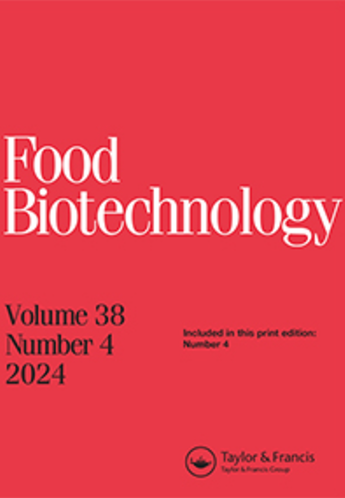矮芽孢杆菌K22产碱稳定木聚糖酶及其在番茄汁澄清中的应用
IF 1.6
4区 农林科学
Q4 BIOTECHNOLOGY & APPLIED MICROBIOLOGY
引用次数: 6
摘要
摘要从位于巴基斯坦卡拉奇Manghopir地区的温泉中分离到一株产木聚糖酶的短小芽孢杆菌K22。通过丙酮沉淀和尺寸排阻色谱法将酶纯化至均匀。通过十二烷基硫酸钠-聚丙烯酰胺凝胶电泳(SDS-PAGE)测定分子量为约24kDa。纯化的木聚糖酶在较宽的温度(20-70°C)和pH(5.0-10.0)范围内保持其活性,在50°C和pH 8.0时具有最大稳定性。木聚糖酶活性被Zn2+、Cu2+和Hg2+金属离子抑制,而在Mn2+、Ca2+和Mg2+存在下保持稳定。EDTA、PMSF和β-巯基乙醇等化学试剂也抑制了该活性。该酶在除甲醛和甘油外的所有有机溶剂(20%)存在下都是稳定的,这抑制了其活性。用纯化木聚糖酶处理番茄果肉提高了果汁产量(30%)、澄清度(9%)和还原糖(69%),表明番茄果肉的物理化学特性有所改善。本文章由计算机程序翻译,如有差异,请以英文原文为准。
Production of an alkali-stable xylanase from Bacillus pumilus K22 and its application in tomato juice clarification
ABSTRACT A xylanase-producing bacterium Bacillus pumilus K22 was isolated from hot spring located in Manghopir area, Karachi, Pakistan. The enzyme was purified to homogeneity by acetone precipitation and size exclusion chromatography. The molecular weight was determined to be approximately 24 kDa by sodium dodecyl sulfate-polyacrylamide gel electrophoresis (SDS-PAGE). The purified xylanase retained its activity at wide range of temperature (20-70°C) and pH (5.0–10.0) with maximum stability at 50°C and pH 8.0. Xylanase activity was inhibited by Zn2+, Cu2+, and Hg2+ metal ions while it remained stable in the presence of Mn2+, Ca2+ and Mg2+. The activity was also inhibited by chemical reagents such as EDTA, PMSF, and β-mercaptoethanol. The enzyme was stable in the presence of all organic solvents (20%) except formaldehyde and glycerol, which inhibited its activity. Treatment of tomato pulp with purified xylanase-increased juice yield (30%), clarity (9%), and reducing sugars (69%), indicating an improvement in physico-chemical characteristics of the tomato pulp.
求助全文
通过发布文献求助,成功后即可免费获取论文全文。
去求助
来源期刊

Food Biotechnology
工程技术-生物工程与应用微生物
CiteScore
3.80
自引率
0.00%
发文量
15
审稿时长
>12 weeks
期刊介绍:
Food Biotechnology is an international, peer-reviewed journal that is focused on current and emerging developments and applications of modern genetics, enzymatic, metabolic and systems-based biochemical processes in food and food-related biological systems. The goal is to help produce and improve foods, food ingredients, and functional foods at the processing stage and beyond agricultural production.
Other areas of strong interest are microbial and fermentation-based metabolic processing to improve foods, food microbiomes for health, metabolic basis for food ingredients with health benefits, molecular and metabolic approaches to functional foods, and biochemical processes for food waste remediation. In addition, articles addressing the topics of modern molecular, metabolic and biochemical approaches to improving food safety and quality are also published.
Researchers in agriculture, food science and nutrition, including food and biotechnology consultants around the world will benefit from the research published in Food Biotechnology. The published research and reviews can be utilized to further educational and research programs and may also be applied to food quality and value added processing challenges, which are continuously evolving and expanding based upon the peer reviewed research conducted and published in the journal.
 求助内容:
求助内容: 应助结果提醒方式:
应助结果提醒方式:


